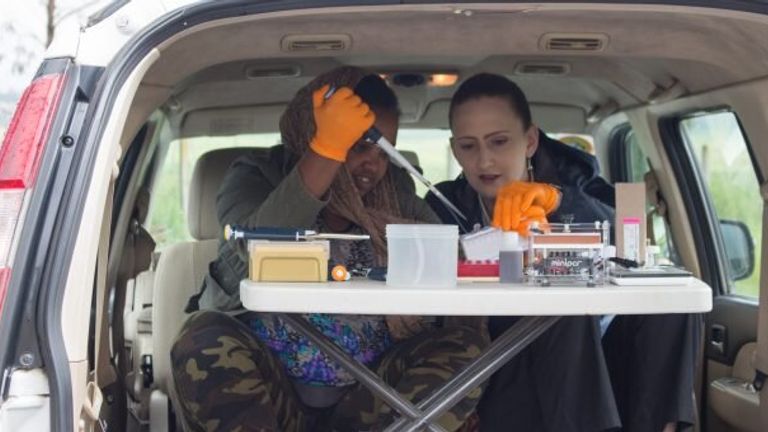Cereal killer to face justice as new tech combats wheat fungus
Wheat rusts have been the bane of farmers for generations, with the fungus capable of ruining a good crop.
Wednesday 14 August 2019 16:02, UK
One of the oldest and most notorious cereal killers in the world may finally be about to face justice.
Wheat rusts have been the bane of farmers for generations, with the fungus capable of ruining a good crop and ending any hope that its grains may eventually find their way into your breakfast.
But scientists have now created a new mobile surveillance technique to rapidly diagnose the issue within just 48 hours, allowing for it to be nipped in the bud before it spreads too far.
The findings are detailed in the journal BMC Biology and could be a game-changer for farmers, who have had to cope with strains of rust capable of adapting to wheat grown to be resistant to infection.
It means the best way to stay ahead of the rusts is to quickly identify and track the disease in the field.
Dr Dave Hudson, co-author of the study, which was carried out in Ethiopia, said: "Knowing which strain you have, is critical information that can be incorporated into early warning systems and results in more effective control of disease outbreaks in farmer's fields."
The new system has been dubbed MARPLE (Mobile And Real-time Plant Disease), and Dr Hudson and his colleagues are confident it make coping with wheat rusts far less of a mystery.
It is able to target specific parts of its genetic code to identify whether the strain is one that has been faced before or a new one, which will help farmers know how best to protect their crops.
Dr Diane Saunders, who led the study and leads research at the John Innes Centre in Norwich, said "The challenge is that tracking the wheat rusts is not as simple as you would expect. There are many different strains, all with unique characteristics that cannot be told apart without lengthy in-lab tests.
"Identifying which ones are a threat can take many, many months, likely by which time the infection has spread."
As well as saving time, its portability means MARPLE could be easily deployed anywhere in the world, and it is designed to be simple to use so that farmers with less facilities or specialist knowledge can take full advantage.
It is hoped that its successful trial in the Ethiopian town of Holeta will see it rolled out in other areas in future.




